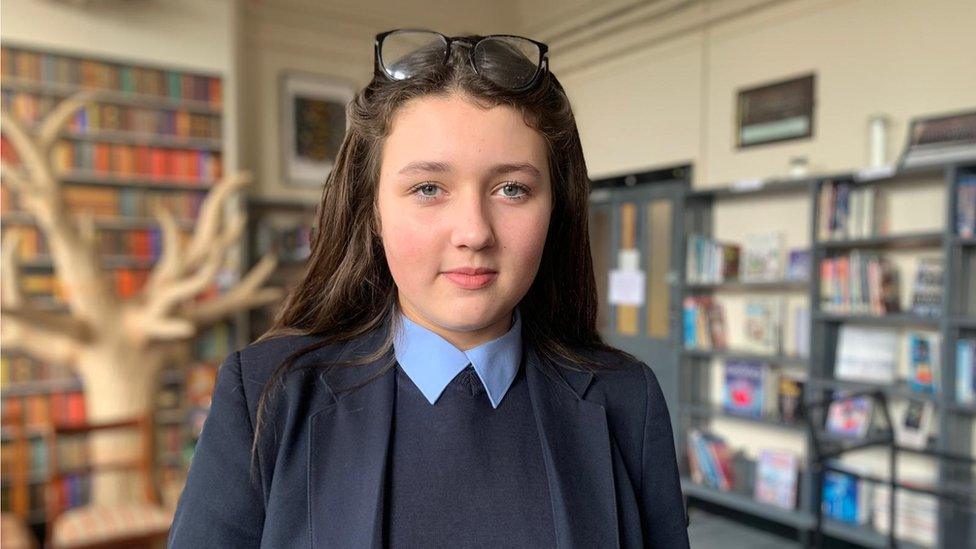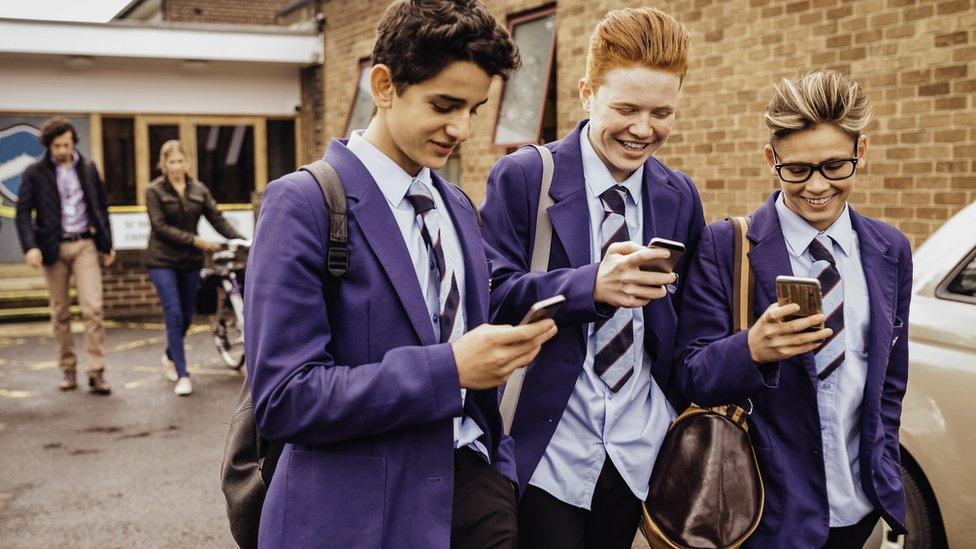Schools in England given new guidance on stopping phone use
- Published

Schools in England have been given new guidance intended to stop the use of mobile phones during the school day.
The government said the move was part of a plan to "minimise disruption and improve behaviour in classrooms".
It added that many schools had already banned phones and the change would ensure a consistent approach.
But one school leaders' union said the most compulsive use of phones happened out of school and called the change a "non-policy for a non-problem".
The guidance comes almost three years after the government first called for a ban on phones in schools.
Education Secretary Gillian Keegan told BBC Breakfast that the guidance aimed to offer "consistency to reset the social norm that there is no place for mobile phones in our schools all the way through the school day".
She said there was currently a mixed picture on policy, with some schools allowing use of mobiles during break times and others having an outright ban.
Asked if she would go further and bring in legislation, Ms Keegan said: "We would consider what more needed to be done if it [the guidance] did not work".
Phoebe, a Year 9 student at Sacred Heart Catholic Academy in Crosby, Liverpool, says her school's policy on phones - where pupils can have them but not use them during the school day - helps them focus on their work.

Phoebe, 14, says she has her phone with her but is not allowed to use it during the school day
"If the rule wasn't there I think kids would use their phones a lot more," she said.
"It shows kids discipline to not go on their phones and actually focus on lessons."
The new guidance sets out a number of examples to illustrate how a phone-free environment could be achieved, including a total ban on them on schools premises, or rules requiring that handsets are given in at the start of the day.
It also says schools could allow pupils to keep possession of their phones but "only on the strict condition that they are never used, seen, or heard" during the day.
The guidance states that school leaders should "develop and implement a policy... which reflects their school's individual contexts and needs".
It adds that schools have a legal duty to ensure pupils' welfare and that stopping phone use during the day is "essential" to ensuring teachers can deliver the curriculum.
Head teachers are also reminded that they are allowed to search pupils for items banned under schools rules and have legal protection from being sued over loss or damage to confiscated items.
The government also cited a survey of secondary school pupils in which 29% of respondents reported phones being used when they were not supposed to be in most or all lessons.
But the Association of School and College Leaders (ASCL) union said it did not expect the new guidance to have any discernible effect.
"Most schools already forbid the use of mobile phones during the school day, or allow their use only in limited and stipulated circumstances," said general secretary Geoff Barton.
"We have lost count of the number of times that ministers have now announced a crackdown on mobile phones in schools. It is a non-policy for a non-problem.
"The government would be far better off putting its energies into bringing to heel the online platforms via which children are able to access disturbing and extreme content."
Focus should be on 'things that matter'
Mr Barton told BBC Breakfast the government should focus on "things that matter - funding, special needs, the need for us to be able to stop crumbling schools... all of those things are the big issues for parents rather than something about mobile phones in schools yet again."
The announcement comes shortly after Esther Ghey, the mother of murdered teenager Brianna Ghey, called for changes to the law to stop children having access to social media apps on their phones.
She called for a law to be introduced so that there are mobile phones that are only suitable for under-16s - an idea backed by the Children's Commissioner for England, Dame Rachel de Souza.
But Ms Keegan told the Today programme a phone for under-16s was "not something we have looked at or considered".
"There's lots of good that phones do as well, safety and peace of mind for parents, knowledge at your fingertips. But we need to make sure harmful content is not available to children," she added.
Pepe Di'Iasio, head teacher at Wales High School in Rotherham and incoming general secretary of the ASCL union, told the Today programme his school's ban had made a "massive difference", but said phones were still important for children to be able to contact parents or pay bus fares.
He said he was "not aware of a school which has phones available throughout the day".
Ms Keegan has said the government's latest survey data, which she said was "a bit out of date", suggested about half of schools did not restrict mobile phone use.
Teacher Tapp, which provides daily surveys of thousands of teachers, published data last January, external which suggests only about 1% of schools have no restrictions in place at all on phones in school.
There are currently no complete bans on mobile phones in schools in Wales, Scotland and Northern Ireland, where decisions on education are devolved from the UK government.
In July last year, the United Nations warned phones were a source of distraction for pupils and could lead to cyber-bullying, adding that just under one in four countries worldwide had policies banning phones in schools.
Related topics
- Published15 February 2024

- Published20 June 2018
